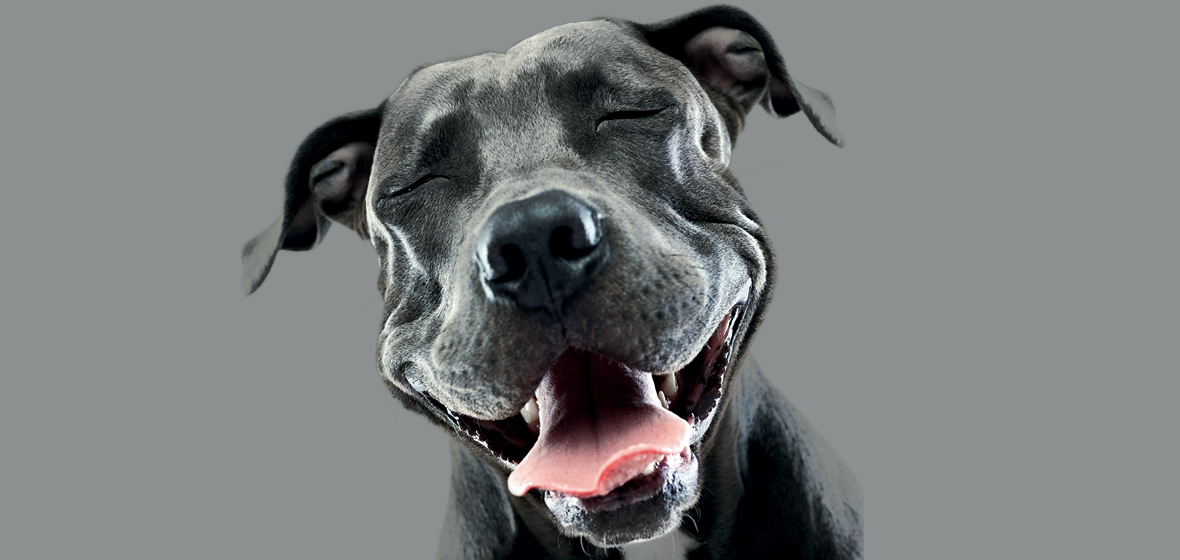As the Department of Justice’s pilot program allowing dogs into selected NSW courthouses comes to an end, CLAIRE CHAFFEY and LYNN ELSEY examine how animals are becoming an increasingly important part of a healthy justice system.
The Attorney-General’s Labrador could never be a therapy dog. The mischievous, unashamedly rambunctious pooch has had his stomach pumped four times and has cost his owner, The Honourable Mark Speakman MP, no less than $20,000 in vet bills.
“He is beyond redemption,” laughs Speakman as he high-fives the much better behaved Hugo the Cavoodle on the steps of Manly courthouse. “If he were here, he would go and stick his nose straight into all the bags. He is brazen and shameless.”
Hugo, along with his therapy dog teammates Norman the Spoodle and Gigi the Poodle, are all perfectly well-mannered and highly qualified for the important job of making the experience of attending court a little less overwhelming.
The pooches’ primary qualifications are that they have beautiful temperaments, are obedient, and absolutely love people (not to mention treats). They also have owners willing to volunteer their time to The Delta Society, which provides therapy dogs to nursing homes, hospitals, corporate clients – and now courts.
The dogs form part of a squad that has been working at Manly Local Court since April 2017, when the New South Wales Department of Justice launched a pilot program to examine the effects of having therapy dogs in the court precinct following positive trials in the US, Canada and New Zealand.
And so far, so good.
“This program is so beneficial for court users,” says Speakman. “If witnesses and parties have the calming effect [of dogs], it reduces their trauma when they have to relive traumatic episodes. It’s also good for the judicial system in that it generates better evidence. If people are calmer and less stressed, they will give their evidence more accurately and more effectively. It improves judicial outcomes.”
The pilot program, which initially was due to wrap up in October 2017, was extended until January 2018. A decision is expected this month regarding expanding the program to other local and district courts around the state.
While the decision rests on a final report, all signs at this stage are positive.

The body of evidence around the power of therapy animals to ease stress and trauma is growing; more jurisdictions around the world are recognising the value of making the court experience a more positive one for everyone involved – including police and court workers.
“We are getting a lot of positive feedback at the moment,” says Speakman. “I am very confident and would love to roll it out in as many courts as I can. I am a dog lover and I have seen in other contexts – in nursing homes, for example – the therapy that the dogs can provide.”
The body of evidence around the power of therapy animals to ease stress and trauma is growing; more jurisdictions around the world are recognising the value of making the court experience a more positive one for everyone involved – including police and court workers.
Several jurisdictions in the US have been using dogs as justice warriors since 2011. Rikki, a Golden Retriever rescued as a
puppy in the aftermath of Hurricane Katrina, paved the way for Florida to allow therapy dogs in the witness box with traumatised
child victims.
In 2014, Hawk, a black Labrador, became the first Canadian dog allowed into the courtroom, assisting a traumatised young girl to give evidence of sexual assault. His owner told Global News at the time: “There’s no science to it. He comes and he’s well trained, he’s obedient, and he sits and people pet him. It’s really that easy.”
Louie, another Labrador, made headlines in New Zealand in 2016 when he inadvertently became the country’s first-ever courthouse dog. His owner, a victim’s adviser, feared that two young girls she was working with wouldn’t be able to give evidence of sexual crimes against their father, because of their distress. In a moment of clarity, she sought permission from the court to enlist her dog Louie for the job of calming the girls. It worked a treat and now Louie is a regular fixture at the court as Chief Comforter to victims of sexual assault, many of them children.
“It just reinforces that [the victims are] in a safe place,” Louie’s owner Gail Bryce told LawTalk in 2016. “They’re safe and Louie’s got their back. And afterwards, they can be fairly emotional, and it’s just being able to have a cuddle with Louie. He’s a big black Lab, he’s a big bear, and the children just love cuddling him – and he’ll take any amount of that; he’ll do it all day, every day.”
The Delta dogs working at Manly are not allowed in the courtroom, but instead wander around the waiting areas with their owners, offering licks, pats, and endless comfort to those who want it. Speakman has not ruled out the possibility that, if rolled out, the program would allow the dogs greater access to judicial spaces. “Possibly, in the long run, there would be scope to allow dogs into the courtrooms and into the witness box,” he says.” We will wait and see.”
And while the occasional person says they don’t like dogs – or mistakes them for sniffer dogs – the overwhelming reaction to their presence is positive. Jacinthe Brosseau, Delta’s Sydney Therapy Dogs Branch Coordinator, says it is remarkable to witness the power of dogs to take people from tears to laughter and distract them from their worries, if even for a little while.
“People tend to open up more when the dogs are around,” says Brosseau. “We hear so many touching stories. People are often surprised – but delighted – to see a dog in the courthouse. The feedback is just so overwhelmingly positive.”
We hear so many touching stories. People are often surprised – but delighted – to see a dog in the courthouse. The feedback is just so overwhelmingly positive.
JACINTHE BROSSEAU,
Sydney Branch Coordinator,
Delta Therapy Dogs
Pigs (and ducks) do fly …

Last year, Twitter was ablaze with photos of Daniel, an emotional support duck accompanying a woman on a US flight. Fortunately, Daniel is well trained, always wears nappies and trainers in public, and prefers a window seat.
Anyone who has recently travelled around the US might have noticed a proliferation of furry and feathered travellers. Dogs, ducks and other weird and wonderful animals are taking to the skies in droves, following the exploding popularity of emotional support animals (ESAs).
Unlike service animals, such as specially trained dogs (or even miniature horses), which perform tasks for people with disabilities, ESAs are used to provide therapeutic benefits for people with diagnosed mental or emotional disorders. Because ESAs aren’t specially trained or defined, they don’t have the same automatic access rights to public areas as service animals, which is why airlines have developed their own requirements and restrictions for these animals.
As the number and type of ESAs swells – including pigs, snakes and kangaroos – concerns about passenger safety and the sanity of the other passengers are leading to arguments, lawsuits and the banning of some types of animals, and their owners, from flights.
Pawsitivity in the office
The calming and healing benefit of animals hasn’t gone unnoticed in the office environment.
Until recently, canine-friendly workplaces were generally limited to the creative industries or boutique-type businesses, often based in less traditional offices on the fringes of the CBD.
Now, though, it appears that dogs and other furry friends are making inroads into the corporate world. Google, for example, proudly promotes its dog-friendly credentials. The tech giant’s official dog policy makes it clear that man’s best friend is also Google’s favourite pal: “Google’s affection for our canine friends is an integral facet of our corporate culture. We like cats, but we’re a dog company, so as a general rule we feel cats visiting our offices would be fairly stressed out”.
Not to be outdone, Amazon provides dog biscuits at reception, has a doggy drinking fountain, and even named a building after the first dog to “work” at Amazon, Rufus. The dogs of Amazon also have their own webpage.
Dog’s aren’t just darlings of the tech world. SBS is a member of the pack. The Sydney office allows staff to bring their furry friends to work, on an occasional basis.
“Dogs at work bring smiles to people’s faces,” says SBS CEO Michael Ebeid. “They allow people to talk to each other in hallways and other places in the workplace where people might ordinarily just past each other. They are a great ice breaker.
“It really changes the mood in the office. It humanises people, gives you an insight into colleagues, creates great conversations and breaks down barriers.”
It’s also a plus for dogs, which otherwise might be stuck at home alone all day, Ebeid notes.
The SBS dogs are expected to follow a few rules, including being well-behaved, non-aggressive, toilet trained, and they can never be left unattended. Their owners have full responsibility for them at all times.
“We have not seen any downsides over the past five years. We have not had any issues at all,” says Ebeid, whose dogs Zoe and Ella are frequent visitors to the office.
The AFL is another dog-friendly employer. To keep the office functioning smoothly, dog owners need to follow a two-page policy, which includes booking visiting dogs into the “Dog Calendar” and arranging a godmother or godfather to look after the dog when the owner is in a meeting. Visiting dogs must be good with humans, be presented in a clean manner (preferably washed and groomed), stay out of designated dog-free areas, and eat snacks and food that are not smelly.
It’s not always a dog’s world. At Sydney law firm Nomos, Buster, a 22-year-old cat, keeps a careful eye on legal matters in the office and helps temper the emotions and stress of staff and clients.
“He’s a total focus of practice. He’s there in the good times and the bad times,” says director Peter Papadopoulos. “When anyone gets stressed, he gets a cuddle. Clients are often anxious when they come to see us. It might be the first time they’ve seen a lawyer. So when they walk in the door and see him in his basket, we can talk about the cat rather than a pending deportation.”
Take that, Google.




